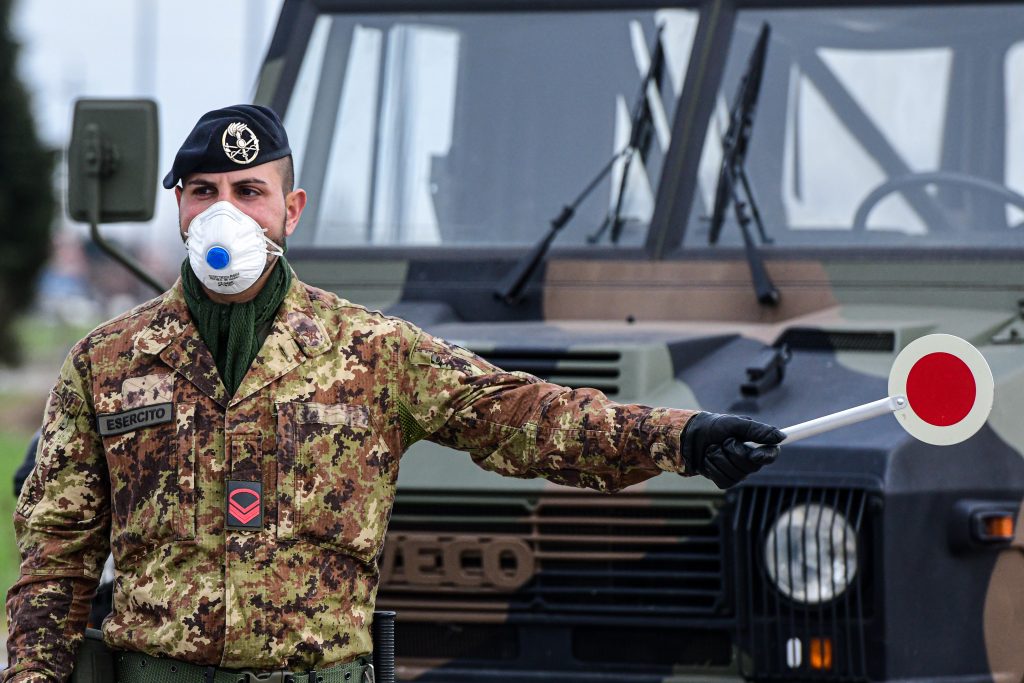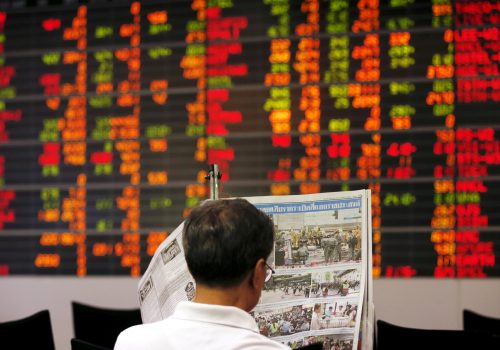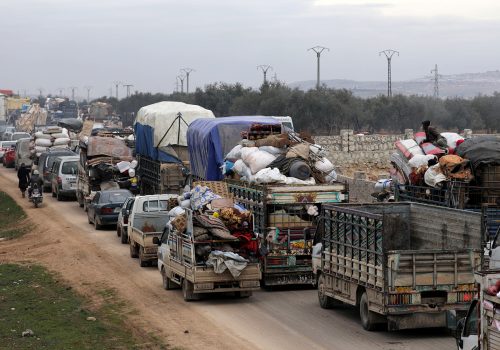The coronavirus pounded the European Union this week with the biggest test of its political, economic and social fabric since the refugee crisis of five years ago.
The ripples from the European Migrant Crisis of 2015 continue until today with its dual shock to the EU’s unity and domestic politics. It triggered a wave of populism and nationalism, the United Kingdom’s withdrawal from the EU, and Germany’s political fragmentation behind the weakening of Chancellor Angela Merkel.
Most dramatically, the Turkish government this week backed off from its commitment made in 2016, in return for 6 billion euros in EU funds, to prevent Syrian refugees from entering Europe. That followed a Thursday airstrike by Russian-backed Syrian forces in Syria’s Idlib province, killing at least 33 Turkish troops.
Even as Turkey ordered police, coast guard and border security officials to allow would-be refugees to pass into the EU, Bulgaria responded by sending an extra 1,000 troops to the frontier with Turkey and Greek police launched smoke grenades at one crossing to dissuade migrants.
Containing pathogens is a much different business than managing waves of refugees. However, what unites the two issues is how dramatically the European Union’s response will shape public attitudes about the institution’s relevance, responsiveness, and effectiveness at a crucial historic moment.
The impact of coronavirus on Europe’s future has the potential to be even more significant than the migrant crisis, particularly as it unfolds in almost biblical fashion atop a plague of other European maladies.
Get the Inflection Points newsletter
Subscribe to Frederick Kempe’s weekly Inflection Points column, which focuses on the global challenges facing the United States and how to best address them.
They include, but by no means are limited to: economic slowdown and possible recession (made more likely by coronavirus), the rise of populism and nationalism (stoked as well by the virus), disagreements about how to handle trade talks with a departing United Kingdom (which start Monday), internecine fights over the European budget, and ongoing German leadership crisis and French social upheaval.
The coronavirus morphed this past week into an increasingly global phenomenon that experts agree can no longer be contained. The hit to stock markets last week was $6 trillion, the biggest weekly fall since the 2008 financial crisis. By Friday, the WHO reported more than 78,000 cases and more than 2,790 deaths in China – and 70 deaths in 52 other countries.
In Europe, what began as a northern Italian phenomenon – where there have been more than 800 infections and 19 deaths – has now reached Spain, Greece, Croatia, France, the UK, Switzerland, Romania, the Netherlands, Austria, Germany, Sweden, Norway, Belgium, Denmark, Estonia, North Macedonia, and San Marino.
Italians have cancelled their carnival celebration in Venice and Milan Fashion Week. European hotels– in Austria, France, and the Spanish Canary Islands–have been locked down in quarantine.
Though individual EU member states set their own health policies, the EU is responsible for coordinating response to the disease and providing advice regarding its still-open borders.
In most countries, citizens turn to national leaders for response in such situations. In a borderless European Union, which prides itself on free movement of people and travel, crisis response becomes a test of the institution itself and the philosophies behind this unique grouping of 27 member states with about 445 million citizens and $16 trillion GDP.
Thus, much attention this week was paid to whether and how individual EU countries – or the EU itself – might abandon the 1985 Schengen Agreement that brought 26 of its nations into a passport-free zone of travel.
This has been one of the greatest sources of EU pride and identity. At the same time, the agreement is far more flexible for such moments of crisis than many outsiders recognize. Some countries, for example, have already been using Schengen’s provision to impose temporary restrictions for security reasons. The rules allow for the temporary reintroduction of border controls for reasons that include migrant surges, terror attacks, or– crucial for the moment – health emergencies. The question now is how much the original spirit of Schengen still applies if these suspensions become more frequent.
“Paradoxically,” argues Benjamin Haddad, director of the Atlantic Council’s Future Europe Initiative, “one might argue that moments like these are made for the European Union.”
That’s because, Haddad explains, such moments require the level of technical cooperation and shared decision-making among countries that is the very basis of the European Union. The EU acts as a regulatory superpower through the “normative” power of its trade deals and other instruments that impose standards, which often become global, in areas including digital, health, environmental, and all manner of industrial sectors.
Yet, if imposing regulatory norms is an EU strength, rapid response at times of crisis remains a weakness.
When it comes to scenarios such as the refugee crisis or coronavirus outbreak, member states often take back control, as they did in 2015.The coronavirus will give new ammunition to those who want national border controls tightened or restored.
Marine Le Pen, the right-wing French nationalist, has called for border closures with Italy. In Switzerland, not an EU member but part of the border-free zone, right-wing political leader Lorenzo Quadri said it was “alarming” that the open borders “dogma” would be considered a priority at such a time.
As the number of coronavirus cases grows in Europe, it seems unlikely that EU and national officials will be able to avoid the greater imposition of border controls. On Sunday evening, for example, Austria halted some train connections at the Brenner pass with Italy after officials reported that two passengers had been stopped who were infected with the virus.
If the EU and its member states respond smoothly and in a coordinated fashion, the coming days could reinforce the collective value of the European Union.
Should the EU appear ineffective as the virus spreads, that will color European attitudes for decades to come.
In his classic 1945 novel The Plague, the French writer Albert Camus writes, “I have no idea what’s awaiting me, or what will happen when this all ends. For the moment I know this: there are sick people and they need curing.”
“The virus, alas, has so far been tackled by a divided continent, just like the plague isolates people in Camus’s plot,” Gianni Riotta, a visiting professor at Princeton University, tells Judy Dempsey at Carnegie Europe. “Austria scrapped trains from Italy, Italy broke with the European Union, too hastily grounding flights from China, only to see the disease spread faster with passengers arriving unchecked from other airports.”
It’s not too early to ask whether Europe itself will fall victim to the virus – or emerge healthier from the challenge.
This article originally appeared on CNBC.com
Frederick Kempe is president and chief executive officer of the Atlantic Council. You can follow him on Twitter @FredKempe.
MUST-READS FROM A WORLD IN TRANSITION
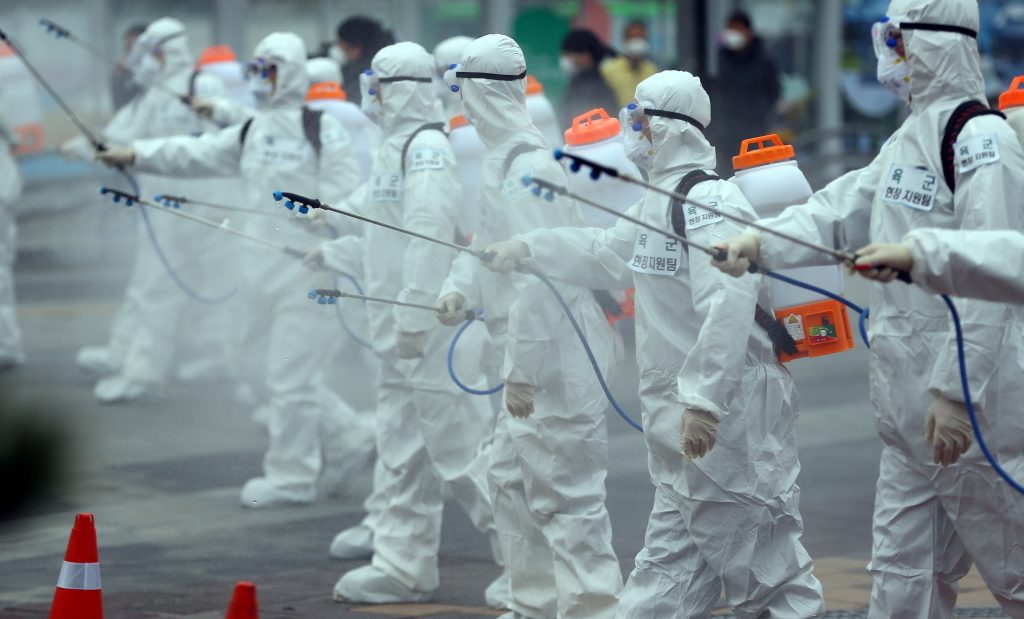
Last week’s Inflection Points (URL) warned that global investors were being complacent about threats to the global economy in the face of coronavirus. Oh my, how much can change in a just a few days in our volatile world.
This week’s top reads in our Coronavirus Special Edition lead with the Wall Street Journal’s look at the week that erased $3.6 trillion from the stock market – and why it is impossible to know what might happen next.
They include Robin Wright’s look in The New Yorker at coronavirus’ uniquely profound hit to Iran, the country that has the highest mortality rate, one that has reached key government officials. The FT’s Gideon Rachman looks at how disease has changed history in the past – and could do so again.
And the New Yorker’s Evan Osnos argues that the primary lesson of the devastating Spanish flu outbreak in 1918, which eventually killed more people than both World Wars combined, was “to tell the truth.” We’re now counting the costs in lives of current leaders not heading that lesson.
This week’s must-read comes from Yaroslav Trofimov, from the cover of the Weekend WSJ’s Review section. He looks at how growing parts of Europe are waking up to the dangers of an authoritarian China – even as they scratch their heads about the U.S. trajectory.
#1. A $3.6 TRILLION WAKE-UP CALL
The Week That Erased $3.6 Trillion From the Stock Market
Akane Otani and Peter Santilli / WALL STREET JOURNAL
Just last week, U.S. stocks were at record levels, seemingly impervious to coronavirus. “Then reality took hold,” the WSJ headline reads.
“Financial markets are in unsettlingly new territory,” write WSJ reporters Otani and Santilli. “…the coronavirus represents something new: a non-financial, exogenous force whose impact on the global economy is huge and unknowable. The smartest minds on Wall Street and beyond are having difficulty discerning whether the epidemic will end up being a short-term disruption, or a more sustained and lasting threat that upends the lives of millions of people around the world.” Read More →
#2. THE NEW IRANIAN THREAT
How Iran Became a New Epicenter of the Coronavirus Outbreak
Robin Wright / THE NEW YORKER
Robin Wright, the New Yorker writer whose work frequently appears in this space, explains how Iran, a country of 83 million people, “has now become one of the global epicenters of the coronavirus – with the highest mortality rate in the world.”
Based on official numbers, the death rate among the infected is at between 8 and 18 percent – compared to just 3 percent in China and less elsewhere.
Beyond that, it has hit a disproportionate number of senior officials, such as the spokeswoman for the students who sized the US embassy in 1979 and the deputy health minister, Iraj Harirchi, who posted a video from his quarantine, saying: “This virus is democratic, and it doesn’t distinguish between poor and rich or statesman and an ordinary citizen.” Read More →
#3. THE GEOPOLITICS OF CORONAVIRUS
Coronavirus: how the outbreak is changing global politics
Gideon Rachman / FINANCIAL TIMES
Gideon Rachman begins the FT’s “Big Read” of this weekend, quoting from a plaque at the English seaside town of Weymouth. It reminds its readers that “the Black Death” entered England through that port in 1348 and killed 30-50 percent of the country’s population.
“International epidemics are a centuries-old phenomena that have often changed the course of history,” he writes. He reflects on how the pathogens could make both Donald Trump and Xi Jinping more vulnerable politically – and pose a particular threat to poorer countries and refugees.
Coronavirus mortality rate is sufficiently low, and health care has far advanced, so the percentages won’t be as devastating as in the 14th century. However, Rachman quotes one expert who predicts 40-70 percent of the global population will eventually be infected – even if many will have only mild symptoms or none at all. Read More →
#4. THE TRUTH ANTIDOTE AND “THE GREAT INFLUENZA”
The Coronavirus and how Political Spin has Worsened Epidemics
Evan Osnos / THE NEW YORKER
Evan Osnos recounts, quoting from John M. Barry’s detailed history of the Spanish Flu of 1918, how public-health officials initially lied about the pandemic’s spread from a Kansas army base into the civilian world “for the war effort, for the propaganda machine that Wilson had created.”
He then traces how diseases have tested political leaders “fidelity to the facts” throughout history – with rich examples. Yet as the philosopher George Santayana is reported to have said, “those who forget history are doomed to repeat it.” Osnos traces how Chinese, Iranian and now American leaders have misled on the coronavirus – and what cost that could have for the sort of rapid response that could save lives. Read More →
#5. EUROPE’S NEW DOUBTS ON CHINA
Europe’s Face-Off With China
Yaroslav Trofimov / WALL STREET JOURNAL
Yaroslav Trofimov’s must-read on European relations with China recalls the journey to the situation today, with Europe’s infatuation with Beijing fading, from President Xi’s appearance three years ago in Davos as the hero of multilateralism, free trade and fighting climate change.
The most telling quote in the piece comes from Jean-Pierre Raffarin, a former French prime minister, who says: “We have two main worries now. Are we still allies with the U.S.? And where is China heading with its authoritarian turn? What’s at stake for us is to become strong enough that we don’t turn into a ping-pong ball hit by the American and Chinese rackets.” Read More →
QUOTES OF THE WEEK
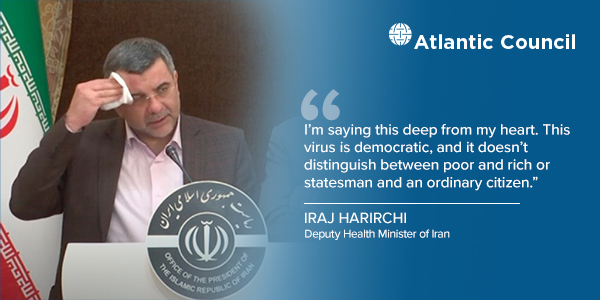
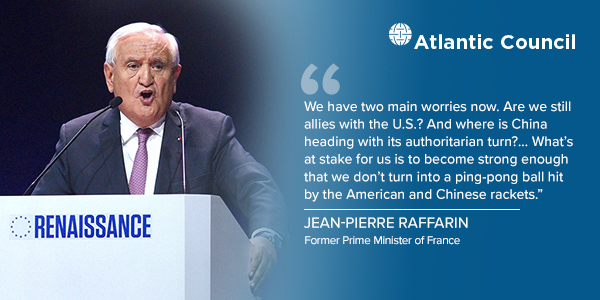
ATLANTIC COUNCIL TOP READS
Image: Castiglione d'Adda, Italy - 27 February 2020: Military personnel wearing protective respiratory masks stand guard at the border of the isolated small town of Castiglione d'Adda as measures are taken to contain the outbreak of Coronavirus COVID-19 (Photo by Piero Cruciatti/Sipa USA)
